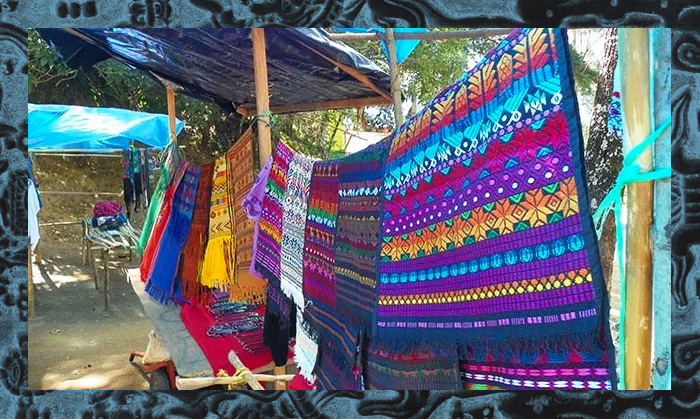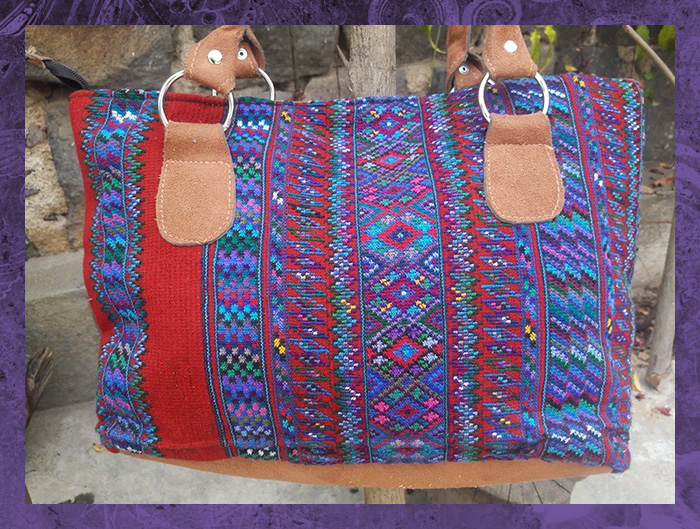In San Juan La Laguna – a town on the shore of Lago de Atitlán in Guatemala – the 20 or so Maya women who make up Casa Flor Ixcaco, a collective that produces organic fabrics, have seen their work misappropriated on several occasions. Plenty of business owners come into the group’s store, ask for a sample of the work, and promise to return to place a large order. But they never come back.
“What happens normally, and it’s happened to me, [is] people come here and ask for samples and [then they create their own products], but now they use chemical dyes and industrialized thread,” Delfina Par, a member of Casa Flor Ixcaco, tells me on the phone in Spanish. “And they say it’s handmade and made by us, but normally what they do is take the samples as an example, and later they produce large quantities, but with low-quality thread. That’s what has affected us most.”
With a single sample, these “ethical fashion” companies can mass produce a garment or bag that they can pass off as the real thing. While they purport to sell all-natural items produced by Maya artisans that benefit these communities, they’re selling lower-quality, mass-produced clothing that they’re able to manufacture cheaply. The Maya women, however, only receive compensation for the sample, while the companies profit immensely from the original textiles these women make.

This practice not only cheapens Maya weavers’ craft – which is rooted in tradition – it also means the wrong people profit as Maya communities continue to struggle. But now Ethical Fashion Guatemala – a new website that allows buyers to purchase products directly from Maya weavers and is spreading awareness of the injustices these communities face – is taking on some of the biggest offenders by pushing for Etsy, Google, and Shopify to remove products and websites that infringe on the artisans’ copyrights. On Etsy alone, the group found more than 64,000 inauthentic products.
Copyright law is difficult to navigate, especially when dealing with as many textiles and products as the artisans of Ethical Fashion Guatemala produce. Through the 1998 Digital Millennium Copyright Act (DMCA), which protects intellectual property on the internet, Ethical Fashion Guatemala is going after the sites selling fake products. Sites like Etsy and Shopify have specific mechanisms in place for DMCA complaints.
Ethical Fashion Guatemala began after Maya weavers and craftsmen asked James Dillon and Kara Goebel to launch a site so they could sell their products. Dillon and Goebel are United States citizens who live in Guatemala and run a tourism company. They’ve worked closely with the indigenous groups around Atitlán for years and have earned their trust in that time. They take 10 percent of sales to cover shipping, running the website, and credit card fees.
What sets Ethical Fashion Guatemala apart is that Dillon and Goebel do not inject themselves into the site. As a site that is “owned by the weavers and artisans of Guatemala,” they don’t place themselves at the forefront – something that other sites claiming to be part of the ethical fashion movement tend to do and that rubs Dillon the wrong way, he explains. Using tools that scrape the web for keywords and phrases, Dillon has found thousands of companies that claim to sell authentic Guatemalan products. He contacts those that seem questionable. If they’re unable to prove their relationship to Guatemalan artisans, he takes action in the form of DMCA takedowns.

Companies mass producing indigenous textiles is a prevalent issue, but it’s not the only thing threatening Maya artisans’ livelihood. Some companies use photos of Maya weavers or play up their connections to them in order to create the appearance that purchasing from these companies helps indigenous groups.
According to Dillon, some companies apologize and take down the offending images, products, and references. But others either ignore his grievances or come back with some strongly worded emails. As Dillon explains, Ethical Fashion Guatemala’s work isn’t universally celebrated or accepted, and along the way, it’s gotten contentious.
But what he and the rest of the Maya weavers are fighting for is necessary, especially when you consider the oppression Maya communities have undergone. Between 1960 and 1996 – Guatemala’s brutal civil war – 200,000 people were killed. 83 percent were Maya, targeted specifically through their dress. As JoAnn DiGeorgio-Lutz and Donna Gosbee’s book Women and Genocide: Gendered Experiences of Violence, Survival, and Resistance states, indigenous women gave up their traditional outfits for their own safety. “Mayan women in rural areas wore traditional dress as a symbolic marker of their identity within a family group and village,” the book reads. “This, however, changed out of necessity during the civil war… Out of necessity as a survival tactic, women abandoned their traditional dress because it could readily identify them to the marauding army as a member of a particular Mayan group.”
Despite the government’s attempt to erase Maya culture, it survived and thrives. And part of that is because of weaving, a tradition passed down from generation to generation. Dina Pop, who along with her husband Nicholas Pop (who makes one-of-a-kind leather products) runs La Cueva, explains that when she turned 5, she began to help her mom weave. By age 10, she could create a textile on her own. And though she has a lifetime of weaving under her belt, it doesn’t make the techniques any easier. It’s still an incredibly time-consuming process.
“Regularly, it takes many days, for example, to make a blouse,” she says in Spanish. “We work with something unique, you could say. Our textiles are so different because in our minds, we design the distinct patterns and afterward we put them in production…. From there, it’s three or four days for a final product.”

In recent years, the internet has played a crucial role in how indigenous communities fight for their intellectual property. In 2015, Mexico’s Mixe community accused French designer Isabel Marant of stealing its huipil designs. And through social media, the case gained international attention. And just last year, the Asociación Femenina para el Desarrollo de Sacatepéquez (AFEDES) – a collective of 1,000 indigenous women working toward social, political, and economic empowerment – pushed to change a system that has long profited from Maya groups and made it impossible for the creators to make economic gains. The group also proposed a legislative reform that would recognize its collective intellectual property, and once again through social media, they drew attention to the injustices they face.
Carlos S. Tzul Tzul, who works for MayaNet – the internet service provider that maintains the Ethical Fashion Guatemala site – believes the internet could truly benefit indigenous communities. “I’m of the thought that technology can help us in all facets if we use it correctly,” he says in Spanish over the phone. Tzul, whose wife Kaila Tzul models for Ethical Fashion Guatemala, adds that a practical way someone can help Maya communities is by teaching them how to use the internet.
“For someone to come who perhaps speaks English and Spanish fluently and can come and impart onto them the knowledge so that they can create a web page, learn how to upload a picture, how to enter a domain, those type of things, that would be excellent,” he says. “In this case, that’s what Jim is trying to do. To me, that would be a big help, in addition to having the ability to learn how the internet works. Then, they can say, we can play the game fairly. Imagine if we had the power, for example, like Coca-Cola or McDonald’s or one of the big corporations, American chains. Imagine if we copied something from them. You think we could do it?”
Dina Pop also urges consumers to recognize the ways in which they are complicit in devaluing artisans’ work. Too often, she explains, visitors seeking to buy directly from Maya weavers haggle for their one-of-a-kind works until they’ve driven the price far down. The women have to choose between not selling the item or taking in less money, and they’ll likely always choose their livelihood. “Many times we don’t get to name our price,” she says. That’s at least one small change we can make as these weavers face an even bigger battle.







